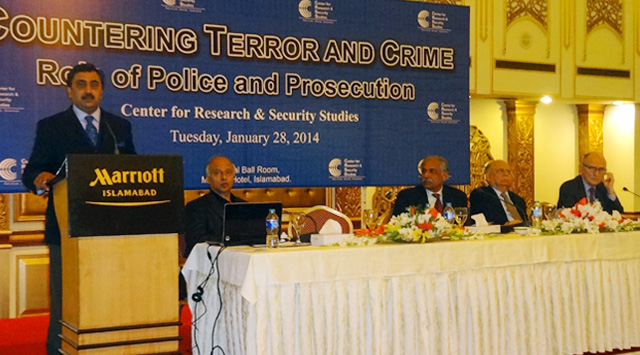The Center for Research and Security Studies organized a Seminar on Rule of Law titled ‘Countering Terror and Crime-Role of Police and Prosecution’ on Tuesday, January 28, 2014 with the distinguished speakers from diverse backgrounds and participants representing civil society, media, diplomats, lawyers, ex-police officers and many others.
At this seminar on the role of the police in the war on terror, experts called for strengthening the force.
An advocacy campaign for a bottom-up demand for better policing and prosecution was also launched at the event, ‘Countering Terror and Crime- Role of Police and Prosecution.’
Mr. Ahmer Bilal Soofi, an expert on international law, said that the Rule of law also means Rule of International Law which includes fulfilling international treaties, pacts and obligations under International Law.
Implementing International Rule of Law would ensure all essential elements of an efficient Criminal Justice System.
Use of force by the state is of course a reluctant choice but incase of Public disorders and a continued deteriorating situation there is no option left.
A strong legislative support is needed for an effective prosecution service. Security strategies in Pakistan are based on focus point and not on focus areas, which is one of the flaws.
He suggested that the criminal justice system must be strengthened while stressing on the need to review political support. A well-coordinated police, judiciary and prosecution is a must. The Focus should be shifted on quality of police, Merit based recruitments, Appointments and promotions on merit, Incentives, fair treatment for all policemen, welfare, medical care, protection, Quality of prosecution to be improved, An active support of government for the departments were all the other suggestions he made during his views.
Former Sindh IGP Afzal Ali Shigri said Pakistan faced a ‘complex and difficult security situation due to widespread terrorism and insurgency.’ While elaborating the role of the police station as a first respondent and a prime source of intelligence for a national database said there was a need to train officials in public relations and service orientation.
In his recommendations he stressed on the need to build strong linkages between the police station and other organizations to facilitate in transmitting information to the central database in real time. Moreover, a security plan with the police station as a key component was absolutely necessary for the war against terror. ‘We need to reorient the direction of the police stations and gear them to focus on this battle against a network of terrorists spread far and wide.’
Moreover, central intelligence units at the federal and provincial levels need to create that link to benefit from these very important sources of information, he stated. ‘This will help in gathering hard intelligence about the terrorists, assessments, trends in terrorism, insurgency and their inter-linkage at the national and international levels.’
While going for huge investments in anti-terrorism forces and units, it is important that the police station is not neglected, Shigri said. ‘If we recognise the importance of the police station as a key element in anti-terrorism strategy and integrate it in the plan, the battle would be half- won,’ he added.
Centre for Research and Strategic Studies (CRSS) Executive Director Imtiaz Gul said cases related to suicide attacks unfortunately lie in cold storage today. Their first information reports were registered against ‘anonymous’ attackers and thus the police couldn–t go any further. In the case of a massive bombing in Khyber Bazaar, the police claimed to have arrested the handler, the carrier but the court released all eight offenders for lack of evidence.
Gul said that the prosecution routinely fails to produce evidence that can be upheld in a court of law, but at the same time, the police are tainted with allegations of corruption and abuse of authority, their job even more complex in cities such as Karachi and Lahore. They also bear the brunt of politicians and are a target for the terrorists.
Robert Perito, author of ‘Police in War: Fighting insurgency, Terrorism and Violent Crime,’ while speaking about the role of the police said, ‘The police should adopt a proactive role rather than a reactive one.’
He said that the strategic principles and the role of the police is the same across all three dimensions of violence.
The role of the police is to protect the community and to establish effective relations with the public. In order for governments to gain public support, responsibility for security should be entrusted to police deployed among the population.
Police are the public face of the government. Police can be a source of legitimacy for the government. By performing their duties in a professional and fair manner they can build support for the government they represent.
Police can establish effective relations with the public in three ways: By being available, responsive, and fair. In the book, we call is CORE VALUES BASED POLICING.
First Availability. Police make themselves available by patrolling, by creating ways that the public can easily contact the police by telephone, and by encouraging the public to come to police stations to report crimes and register complaints.
Second, Responsiveness. Police should respond promptly when called by individuals needing assistance. Police should be willing to listen sympathetically. They should be skilled at taking crime reports, collecting evidence, securing a crime scene, questioning witnesses and, importantly, knowledgeable about the limits of their authority.
Third, Fairness. In their dealings with the public, police should be respectful. They should be professional. They should treat all persons equally and not show preferences to certain groups or discriminate against minorities.
Mr. Tariq Parvez, Former DG FIA, who was moderating the discussion said that the need is to create an enabling environment for Police to work effectively. An amendment in law may also be considered to remove ambiguity from the terrorism act which is very vague. Further said that while making any criticism on the Police, we must not forget political interference that the Police faces more often.


